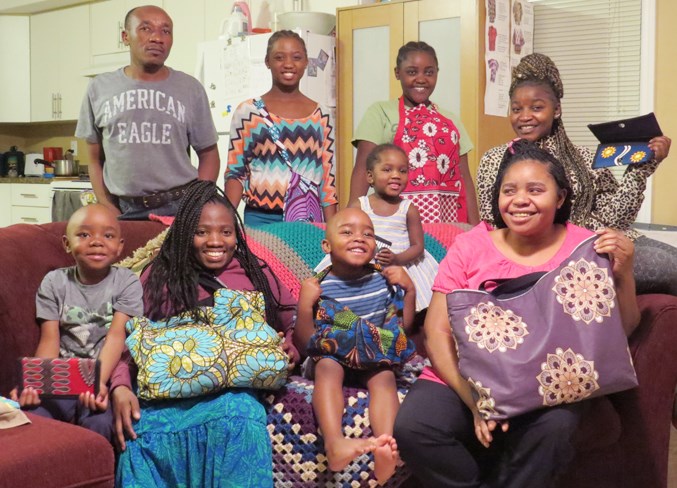A long journey for a pair of families from the Democratic Republic of Congo is continuing with a positive turn in Athabasca that includes new friends, a welcoming community and a business endeavour.
Thirty-year-old Argentine Imanirakunda and 32-year-old Mapendo Ndongotsi moved to the town in December 2017, after having spent four years in refugee camps in Burundi and Uganda, fleeing war after war.
“It was difficult living in the camps,” Imanirakunda said. “We lived in tents, and there were countless numbers of people there with us.”
Since arriving, the two women have continued building Shona Congo, a business they started with a New Yorker that sees their personally designed and sewn projects sold around the world.
Refugee camp experience
Imanirakunda’s sister, Aline Tazubaze, said something that is as simple here cooking food was difficult in the camps.
“We had to use wood to make fires in order to do so,” she said. “It took five to ten minutes to get the fire started. To get water, we usually had to walk two to three hours to fetch and carry it either on our heads or our backs.”
Imanirakunda said her two-year-old daughter, Asantemungu, was born at the refugee camp in Uganda.
“Living here in Athabasca is her first time living outside of the camps,” she continued. “Her name means ‘Thank God,’ as I think she is a miracle.”
Mobility issues made life even more difficult for both Imanirakunda and Ndongotsi.
“I contracted polio when I was five years old,” Imanirakunda said. “A scooter accident at one of the camps put (Ndongotsi) in one, as well. We both ended up using crutches while we were at the camps, as I did not get a wheelchair until I got pregnant with Asantemungu.”
Opening their business
One of the skills each woman had was sewing.
“We started sewing at the Centre for the Handicapped in Goma (Congo) back in 2002,” Imanirakunda said.
There, the two women met New Yorker Dawn Hurley, who lived in Goma, and the three of them started the business Shona Congo in 2008. It was incorporated as a business this past August.
“The word Shona means ‘sew’ in Swahili,” Imanirakunda said. “With Dawn’s help, we were able to sew items like purses, aprons, shirts, wallets and dresses, and sell them to make a profit.”
Ndongotsi said the money helped them to afford some of the basic necessities while they were in the camps.
“We sent our items to Dawn in New York for online sales,” she said. “The money allowed us to visit the hospital and afford basic items like sugar and soup.”
In Canada, Ndongotsi said things are still going really well for Shona Congo.
“We run our business out of our living room,” Ndongotsi said. “We love it when people come by with an interest in what we sell. We also do clothing repairs, as well. We just love the reception we got from all the people here in Athabasca.”
Getting to Canada
The journey of Imanirakunda and Ndongotsi to get to Canada began in 2015, when Hurley put the two women in touch with the Athabasca Interfaith Refugee Sponsorship Society (AIRSS) shortly after their arrival at the Uganda refugee camp in 2015.
Kate Nunn, a volunteer with AIRSS, said it was a long process to get them to Athabasca.
“It took just eight months just to put in their application,” Nunn said. “We applied though a private sponsorship program, and it took another two years to get them here.”
She said they left the Burundi camp in 2014 after two years due to violence erupting in that country.
“It forced them to return to Congo for a year before arriving in Uganda,” Nunn said. “It was shortly after their arrival there that we started their application process to get to Canada.”
Imanirakunda said when they finally left for their new home, it was their first time on an airplane.
“We first took a plane to Belgium,” she said. “Then from there, we went to Toronto, then Edmonton, and finally, we made our journey to Athabasca.”
Joining Imanirakunda was her daughter and her sister, while Ndongotsi was joined by her husband, their two sons, as well as two of her nieces.
“The children are now enrolled in school here in Athabasca,” Ndongotsi said. “In the Congo, school cost money, and studies were constantly interrupted by endless warfare.”
Nunn said Hurley was here in Athabasca for a month during the summer to help the women and their families settle in.
“She helped them out with their business,” she said. “Dawn also helped them improve on their English skills as well.”
Imanirakunda said it is now much easier to sew in Canada, as compared to practicing their craft in Congo.
“Here, we have electricity to power our sewing machines,” she said. “In the Congo, we used a hand-crank machine instead.”
They maintain their online business and also sell their products at the Athabasca Farmers’ Market.
The women are holding an open house for their business Sunday, Nov. 4 from 1-5 p.m. at Nunn’s home at 655013 along Highway 2 in Athabasca. Directions and further details can be found on the website.
“Each product the sell tells a story about their journey, and how they got to where they are today,” Nunn said.



